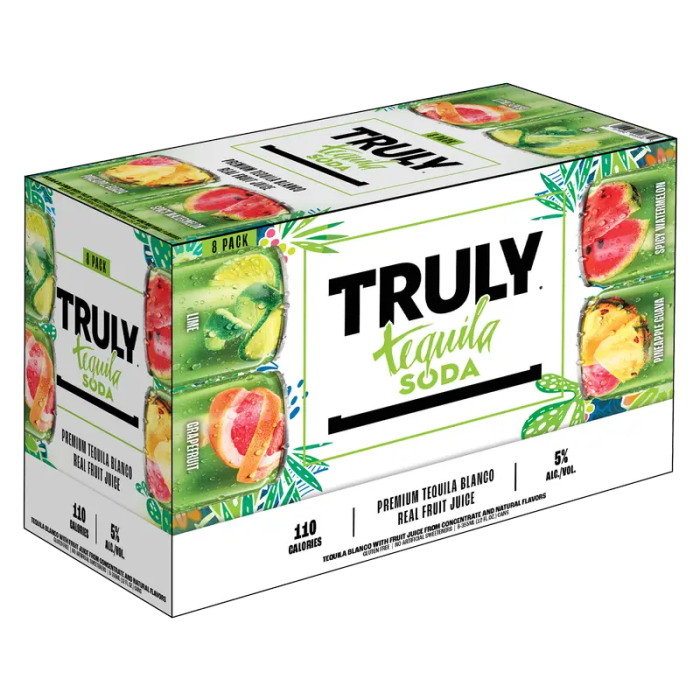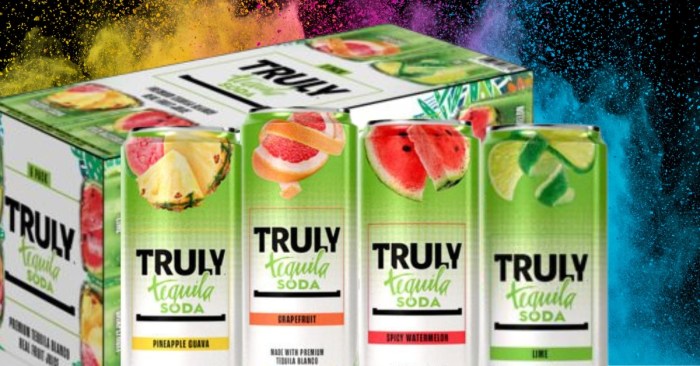Tequila Soda Ingredients & Variations: Truly Tequila Soda Nutrition Facts

Truly tequila soda nutrition facts – The seemingly simple tequila soda belies a surprising complexity in its potential variations. The seemingly straightforward combination of tequila and a carbonated mixer offers a wide spectrum of flavor profiles and, critically, nutritional consequences, depending on the choices made. Understanding these variations is key to making informed, and perhaps healthier, beverage choices.
Tequila Soda Ingredient Breakdown
The core components of a tequila soda are, unsurprisingly, tequila and a carbonated mixer. However, the specific types of each ingredient significantly alter the final product’s taste and nutritional profile. The following table Artikels common ingredients and their variations:
| Ingredient | Type | Typical Quantity | Potential Variations |
|---|---|---|---|
| Tequila | Blanco, Reposado, Añejo | 1.5 – 2 oz | Different brands, varying alcohol content (proof) |
| Carbonated Mixer | Soda Water, Club Soda, Tonic Water, Flavored Sparkling Water | 4-6 oz | Variations in mineral content, added sugars (tonic water, flavored varieties), artificial sweeteners |
| Garnish | Lime Wedge, Orange Slice | 1-2 | Other citrus fruits, herbs (e.g., mint) |
Nutritional Impact of Different Tequila Types
The type of tequila used dramatically impacts the overall nutritional profile, although the differences are subtle in a low-volume drink like a tequila soda. Blanco tequila, being un-aged, generally retains more of the agave’s natural sugars and some volatile compounds. Reposado tequila, aged for a minimum of two months, will have a slightly different flavor profile due to the aging process and may have slightly less sugar content.
Añejo tequila, aged for a minimum of one year, undergoes the most significant transformation in flavor and may have even less sugar content than reposado. However, the alcohol content remains the primary contributor to calories in all cases. The nutritional impact of these variations is minimal in comparison to the mixer used.
Unlocking the nutritional secrets of Truly Tequila Soda reveals a surprisingly low-calorie profile, perfect for mindful sipping. However, for a richer, protein-packed alternative to balance your diet, consider exploring the nourishing depths of kettle fire bone broth nutrition facts , before returning to your refreshing Truly Tequila Soda. Understanding both profiles allows for a more balanced and informed approach to your beverage choices.
Effect of Mixers on Calorie and Sugar Content
The choice of mixer is the most significant determinant of a tequila soda’s calorie and sugar content. Plain soda water or club soda contribute virtually no calories or sugar. However, tonic water, often preferred for its bitter quinine flavor, contains a substantial amount of added sugar, significantly increasing the overall calorie count. Flavored sparkling waters also vary greatly; some are sugar-free, relying on artificial sweeteners, while others contain considerable amounts of added sugar.
For example, a tequila soda made with tonic water can easily contain upwards of 100 calories and 15-20 grams of sugar, while a similar drink made with plain soda water will contain significantly fewer calories and no added sugar. Consumers should carefully check the nutritional information on their chosen mixer to make informed decisions.
Nutritional Breakdown of a Standard Tequila Soda
Let’s dissect the nutritional profile of this deceptively simple cocktail, often touted as a “healthier” alternative. The reality, however, is far more nuanced and requires a critical examination of its purported benefits. We’ll expose the often-overlooked truths behind the seemingly innocent tequila soda.
Macronutrient Composition of a Tequila Soda, Truly tequila soda nutrition facts
The macronutrient content of a tequila soda is largely determined by the type and amount of mixer used. A standard recipe, using 2 ounces of tequila (100% agave) and 4 ounces of club soda, provides a starkly different nutritional profile compared to variations incorporating sugary sodas or juices. The primary source of carbohydrates comes from the tequila itself, which, despite being made from agave, still contains carbohydrates derived from the agave sugars.
Protein and fat content is negligible in this basic recipe, primarily stemming from trace amounts found naturally in the tequila.
Micronutrient Content of a Tequila Soda
The micronutrient content of a standard tequila soda is equally sparse. While tequila, depending on the brand and production method, may contain trace minerals from the agave plant, these amounts are insignificant in the context of daily nutritional needs. The club soda contributes virtually no vitamins or minerals. Therefore, relying on a tequila soda for any meaningful micronutrient intake is simply a fallacy.
Sample Nutritional Label: Standard Tequila Soda (2 oz Tequila + 4 oz Club Soda)
| Nutrient | Amount per Serving | % Daily Value | Notes |
|---|---|---|---|
| Calories | Approximately 90-100 | ~5% | Calories primarily from tequila’s carbohydrate content. Variation depends on tequila brand and proof. |
| Carbohydrates | Approximately 10-15g | ~4-6% | Primarily from the agave sugars in tequila. |
| Protein | <1g | ~0% | Negligible amount. |
| Fat | <1g | ~0% | Negligible amount. |
| Sugar | Approximately 5-10g | Variable | Depending on tequila brand and potential added sugars. |
| Sodium | Variable | Variable | Dependent on the mineral content of the water used in the tequila and club soda. |
| Vitamins & Minerals | Trace amounts | Insignificant | Minimal contribution from tequila; club soda provides virtually none. |
Comparative Analysis of Tequila Soda vs. Other Alcoholic Beverages

The seemingly innocuous tequila soda often gets overshadowed by its more flamboyant alcoholic cousins. However, a critical examination reveals a complex picture regarding its nutritional profile and potential health impacts when compared to other popular mixed drinks. Understanding these differences is crucial for making informed choices about alcohol consumption.
Nutritional Profile Comparison: Tequila Soda vs. Other Alcoholic Beverages
The following points highlight key distinctions in the nutritional makeup of a tequila soda compared to margaritas, vodka sodas, and rum and Cokes. These differences stem primarily from the base liquor, mixers, and additional ingredients.
- Tequila sodas generally contain fewer calories and less sugar than margaritas, which often incorporate sugary mixers like juices and liqueurs. The simplicity of the tequila soda contributes to its lower calorie count.
- Compared to vodka sodas, tequila sodas offer a similar low-calorie and low-sugar profile, provided that both are prepared with plain soda water and no added sweeteners.
- Rum and Cokes significantly surpass tequila sodas in both calorie and sugar content due to the high sugar concentration in cola. This makes rum and coke a less healthy option compared to the other beverages.
Health Benefits and Drawbacks of Tequila Soda Consumption
While moderation is key with any alcoholic beverage, a comparative analysis of potential health impacts reveals subtle yet significant differences.
- The lower calorie and sugar content of tequila sodas compared to many other mixed drinks potentially minimizes the risk of weight gain and related health issues like type 2 diabetes. However, this benefit is negated by excessive consumption.
- The lack of added sugars in a standard tequila soda reduces the immediate blood sugar spike associated with sugary cocktails. This is a positive aspect for individuals concerned about blood sugar regulation.
- Tequila, like other alcohols, carries the inherent risks of liver damage, alcohol dependence, and other alcohol-related health problems with consistent heavy consumption. The lower calorie count does not eliminate these risks.
Calorie, Sugar, and Alcohol Content Comparison
The table below provides a comparative overview of the calorie, sugar, and alcohol content of a standard serving of each beverage. Note that these values can vary based on brand, serving size, and preparation method.
| Drink | Calories | Sugar (grams) | Alcohol Content (%) |
|---|---|---|---|
| Tequila Soda (1.5 oz tequila, 12 oz soda) | 100-150 | 0-5 | ~5-8 |
| Margarita (8 oz) | 200-300 | 20-40 | ~10-15 |
| Vodka Soda (1.5 oz vodka, 12 oz soda) | 90-120 | 0-5 | ~5-8 |
| Rum and Coke (1.5 oz rum, 12 oz cola) | 250-350 | 30-40 | ~8-12 |
Serving Size and Consumption Recommendations

The seemingly innocent tequila soda, a refreshing mix of alcohol and fizz, presents a deceptive simplicity. Its palatable nature masks the potential for significant health consequences if consumed irresponsibly. Understanding appropriate serving sizes and adhering to responsible drinking guidelines is crucial to mitigating these risks.The recommended serving size for a standard tequila soda is generally considered to be one drink, equivalent to 1.5 ounces (44ml) of tequila.
This aligns with standard drink guidelines established by various health organizations. However, individual tolerance and health conditions significantly influence the appropriate serving size. Factors such as body weight, gender, metabolism, and pre-existing health issues must be considered. Individuals with liver conditions, for example, should significantly limit or abstain from alcohol consumption entirely. Furthermore, consuming more than one drink can quickly increase the blood alcohol concentration (BAC), leading to impaired judgment, coordination, and potentially dangerous situations.
Alcohol Content and Its Implications
The alcohol content of tequila varies depending on the brand and type. A typical tequila soda, made with a standard 40% ABV tequila, will contain a substantial amount of alcohol per serving. Excessive consumption of alcohol, regardless of the form, can lead to a range of serious health problems, most notably alcohol-related liver disease. This can manifest as fatty liver disease, alcoholic hepatitis, or cirrhosis, all of which can be life-threatening.
Chronic alcohol abuse is also strongly linked to an increased risk of various cancers, including liver, breast, and colorectal cancers. The seemingly harmless tequila soda, therefore, carries the same inherent risks associated with any alcoholic beverage.
Dehydration and Electrolyte Imbalance
Beyond liver damage, excessive consumption of tequila soda contributes to dehydration. Alcohol is a diuretic, meaning it increases urine production, leading to fluid loss from the body. This can result in headaches, fatigue, and in severe cases, electrolyte imbalances that can affect heart function and other bodily processes. The carbonation in the soda further exacerbates dehydration by potentially irritating the gastrointestinal tract.
The combination of alcohol and carbonation creates a potent dehydrating effect, making responsible hydration practices crucial after any alcohol consumption, especially tequila sodas.
Responsible Drinking Practices and Moderation Strategies
Responsible drinking involves consciously limiting the amount of alcohol consumed in any given timeframe. This includes pacing oneself, alternating alcoholic beverages with non-alcoholic drinks (like water), and being mindful of one’s limits. Strategies for moderation include setting a maximum number of drinks per occasion, avoiding drinking on an empty stomach, and actively monitoring one’s BAC using a breathalyzer or other appropriate methods.
Knowing your personal limits and respecting them is paramount to avoiding negative consequences associated with alcohol consumption. Seeking support from friends, family, or professionals is advisable for those struggling with alcohol control. Ultimately, the responsible enjoyment of a tequila soda, or any alcoholic beverage, hinges on moderation and a conscious understanding of its potential effects on health and well-being.
Ignoring these factors can lead to serious and potentially irreversible health consequences.
Answers to Common Questions
What are the potential health risks associated with drinking too much tequila soda?
Excessive consumption of tequila soda, like any alcoholic beverage, can lead to liver damage, dehydration, and impaired judgment. It can also contribute to weight gain due to high sugar content in some variations.
Are there any health benefits to drinking tequila soda?
The potential health benefits are limited and depend heavily on the ingredients. Tequila itself contains some antioxidants, but these are usually far outweighed by the negative effects of alcohol consumption in excess.
Can I make a lower-calorie tequila soda?
Absolutely! Use a sugar-free mixer like club soda or sparkling water, and avoid adding sweeteners like simple syrup or juices. A lime wedge is a great low-calorie garnish.
How does the alcohol content vary in different tequila sodas?
The alcohol content primarily depends on the type and amount of tequila used. A typical serving will have a similar alcohol percentage to other mixed drinks like vodka sodas.
